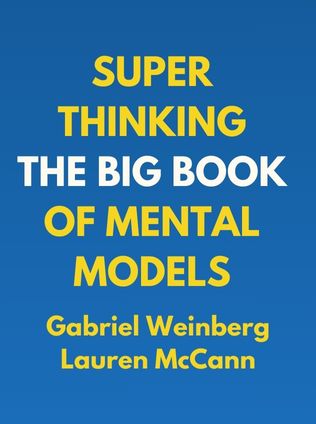
Super Thinking: The Big Book of Mental Models
The Big Book of Mental Models
By Gabriel Weinberg and Lauren McCann
Published 06/2019
About the Author
Gabriel Weinberg and Lauren McCann are the masterminds behind Super Thinking: The Big Book of Mental Models, a comprehensive guide designed to enhance the reader's decision-making abilities through the application of mental models. Weinberg, best known as the founder and CEO of DuckDuckGo, brings his entrepreneurial expertise to the table, offering insights into the business strategies that have made his search engine a $100 million success. McCann, on the other hand, leverages her background as a statistician and her experience with pharmaceutical giant GlaxoSmithKline to deepen the book’s discussions on formal decision-making processes. Together, their combined knowledge creates a unique resource that blends practical business wisdom with scientific rigor, making it a valuable tool for anyone looking to improve their thinking and decision-making skills.
Main Idea
The central premise of Super Thinking is that mental models—conceptual frameworks that help us understand and navigate complex situations—are essential tools for making better decisions in an uncertain world. Weinberg and McCann argue that by mastering a diverse set of mental models, individuals can develop what they call super thinking, the ability to think more clearly, avoid common cognitive traps, and ultimately make smarter choices. The book is structured to provide readers with these mental models, explain their relevance, and demonstrate how they can be applied across a wide range of scenarios, from personal decisions to professional challenges.
Table of Contents
- Mental Models: What They Are and What They’re Good For
- Avoiding Shoddy Reasoning and Unforeseen Consequences
- Efficient Decision-Making
- Professional Uses: Decisions for Successful Companies
Mental Models: What They Are and What They’re Good For
Mental models are the foundational concepts that help us interpret and respond to the complexities of the world around us. These models are not tied to any specific domain; rather, they are versatile tools that can be applied across various fields to enhance our understanding and improve our decision-making. For example, the mental model of supply and demand is a fundamental economic principle, but it can also be used to understand social dynamics, such as how popularity (demand) for a social media platform (supply) can drive its growth.
Weinberg and McCann introduce the concept of super models, which are mental models that are particularly powerful because they can be applied broadly across different contexts. A prime example is the concept of critical mass from physics. In its original context, critical mass refers to the minimum amount of fissile material needed to maintain a nuclear chain reaction. However, this idea can be extended to business, where a company reaches critical mass when it gains enough customers to trigger exponential growth. By mastering these super models, the authors argue that we can achieve super thinking, a higher level of reasoning that allows us to see patterns, make connections, and avoid common pitfalls in our thinking.
"Super models eliminate misconceptions and inefficiencies in our reasoning, instead offering reliable patterns and heuristics to analyze various situations." — Weinberg and McCann
Avoiding Shoddy Reasoning and Unforeseen Consequences
Shoddy Reasoning
One of the key messages in Super Thinking is the importance of avoiding shoddy reasoning. Weinberg and McCann emphasize that our reliance on conventional thinking and intuition can often lead us astray, especially in situations where these approaches are inappropriate. For instance, the practice of bloodletting persisted for centuries as a standard medical treatment, despite its harmful effects, because it was grounded in the entrenched but flawed assumptions of the time.
To combat this, the authors advocate for reasoning from first principles, a method that involves breaking down complex problems into their most basic, self-evident truths, and building up from there. For example, when considering a major life decision such as choosing a career, one might start with the first principle that personal fulfillment and happiness are essential. By focusing on these core values, individuals can evaluate their options more effectively, rather than being swayed by external pressures or conventional wisdom.
Sign up for FREE and get access to 1,400+ books summaries.
You May Also Like
The Subtle Art of Not Giving a F*ck
A Counterintuitive Approach to Living a Good Life
By Mark MansonRich Dad Poor Dad
What the Rich Teach Their Kids About Money - That the Poor and Middle Class Do Not!
By Robert T. KiyosakiHow To Win Friends and Influence People
The All-Time Classic Manual Of People Skills
By Dale CarnegieFreakonomics
A Rogue Economist Explores the Hidden Side of Everything
By Steven D. Levitt and Stephen J. Dubner



















